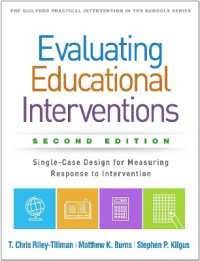- ホーム
- > 洋書
- > 英文書
- > History / World
Full Description
Crisis and Constitutionalism argues that the late Roman Republic saw, for the first time in the history of political thought, the development of a normative concept of constitutionthe concept of a set of constitutional norms designed to guarantee and achieve certain interests of the individual. Benjamin Straumann first explores how a Roman concept of constitution emerged out of the crisis and fall of the Roman Republic. The increasing use of emergency measures and extraordinary powers in the late Republic provoked Cicero and some of his contemporaries to turn a hitherto implicit, inchoate constitutionalism into explicit constitutional argument and theory. The crisis of the Republic thus brought about a powerful constitutionalism and convinced Cicero to articulate the norms and rights that would provide its substance; this typically Roman constitutional theory is described in the second part of the study. Straumann then discusses the reception of Roman constitutional thought up to the late eighteenth century and the American Founding, which gave rise to a new, constitutional republicanism. This tradition was characterized by a keen interest in the Roman Republics decline and fall, and an insistence on the limits of virtue. The crisis of the Republic was interpreted as a constitutional crisis, and the only remedy to escape the Republic's fate -- military despotism -- was thought to lie, not in republican virtue, but in Roman constitutionalism. By tracing Roman constitutional thought from antiquity to the modern era, this unique study makes a substantial contribution to our understanding of Roman political thought and its reception.
Contents
Preface and Acknowledgements
Introduction: The Fall of the Roman Republic and the Rise of Constitutional Thought
I. Inchoate Constitutionalism in the Late Roman Republic
1. "Not Some Piece of Legislation": The Roman Concept of Constitution
2. Infinite Power? Emergencies and Extraordinary Powers in Constitutional Argument
3. "The Sole Bulwark of Liberty": Constitutional Rights at Rome
II. A Hierarchy of Laws: Roman Constitutional Thought
4. Cicero and the Legitimacy of Political Authority
5. Greek vs. Roman Constitutional Thought
III. The Limits of Virtue: The Roman Contribution to Political Thought
6. The Roman Republic as a Constitutional Order from the Principate to the Renaissance
7. Neo-Roman Interlude: Machiavelli and the Anti-Constitutional Tradition
8. Jean Bodin and the Fall of the Roman Republic
Epilogue: Constitutional Republicanism, the "Cant-Word" Virtue and the American Founding
Bibliography
General Index
Index Locorum








